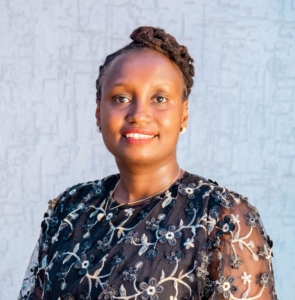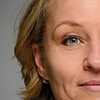Judence Kayitesi – Educator, Author, Survivor of the Genocide against the Tutsi in Rwanda 1994, President of IBUKA*) Germany
“Still, I rise”
In her powerful memoir ‘A Broken Life’ (German version: ‘Ein zerbrochenes Leben’), Judence Kayitesi recounts the unimaginable horrors she endured during the 1994 Genocide against the Tutsi in Rwanda. At just 11 years old, she survived the massacres that nearly wiped out her entire family, leaving her physically injured and emotionally shattered. For years, she was unable to speak, isolated in silence and deep trauma.
Today, after years of rebuilding her health and resilience, Judence lives in Germany, dedicating her life to education, connection, and bridge-building across communities.
Through her tireless advocacy, she raises awareness about the genocide and fosters understanding around the themes of ‘otherness,’ tolerance, and diversity – especially for younger generations who will shape the future.
As President of IBUKA*) Germany, she is committed to creating a strong, compassionate network that unites genocide survivors living in Germany. Her mission is to empower them – through connection, shared resources, and mutual support – to share their own story and to find strength in solidarity.
Judence’s latest project is her new book ‘Unity Quest’, a 31-page workbook containing reflection tasks, information blocks and a comic. It is suitable for pupils aged 12 and over and intends to convey the topic of genocide in a child-friendly way as well as promote understanding for peace and cohesion. In Germany, the association “GloW Karlsruhe e.V.” is working to bring the book to as many schools as possible.
In our interview, we met an incredibly determined woman whose strength stems, above all, from her deep desire to be there for her children for as long as possible – and to live on as a lasting, positive force within them.
What do you remember best – and fondly – about your life before the genocide?
Before the genocide, life had a gentle rhythm and deep sense of belonging. I remember my father’s voice the most – the way he told stories that carried wisdom, and how he strummed his guitar as if each note was a prayer of peace. Those moments were filled with laughter, music, and the comfort of family. He made us feel safe, even when the outside world was growing uncertain. Those memories are more than just pieces of the past – they are my roots, my sanctuary.
In your book ‘A Broken Life’, you recount with great care the events and your personal journey during and after the 1994 genocide in Rwanda. Would it be fair to say that writing it all down served as a form of therapy for you?
Yes, absolutely. Writing ‘A Broken Life’ was like bleeding onto paper – painful but necessary. It gave me a space to put the unspoken into words, to name the silence that haunted me. For so long, I carried my story in silence. Through writing, I allowed myself to mourn, to remember, and to feel. It didn’t make everything okay, but it was the beginning of reclaiming my life and my voice.
How do you deal with memories still surfacing after years of being buried?
Some memories come softly, others like waves crashing. I don’t push them away anymore. I try to face them. I write, I speak with someone I trust, sometimes I simply cry. Healing is not about forgetting; it is about learning to live with what happened. I give myself permission to feel, even if it hurts, because each memory I face brings me closer to freedom.
To what extent is what you experienced in the past still part of your daily reality?
The past lives in me – in my body, in my breath. Some days I walk in the light, other days shadows follow me. A smell, a sound, a moment of silence can open a door to the past. But I have learned not to run from it anymore. Instead, I carry it gently. It’s part of who I am – not all of me, but part.
How do you manage to banish the most harrowing memories – such as the fate of your aunt who was forced to dig her own grave before being thrown into it?
I don’t banish them – I honour them. My aunt’s story is horrific, yes, but she was not only a victim. She was love, strength, and laughter. I remember her, not just what was done to her. And when the pain feels too heavy, I remind myself that my life, my survival, is an act of defiance. I am still here. That matters.
What was it like to feel emotionally numb? What dominated your experience?
It felt like floating outside of myself – watching life happen but not really living it. People laughed, spoke, hugged – and I couldn’t feel any of it. It was like being a ghost in my own skin. I wasn’t alive; I was just existing. But inside that numbness was also a quiet scream – a longing to feel again. And when feeling returned, so did life.
In your second book, ‘Choosing Resilience’ (German version: ‘Die Suche nach der Einheit’), you explore the profound strength of the human spirit – reflecting on the will to live, inner strength, and the deep commitment to oneself. Can you recall the moment when you shifted from merely functioning to consciously living again?
I remember that shift very clearly – not as a dramatic event, but as a quiet awakening. For a long time, I was in survival mode. After losing my family in the Genocide against the Tutsi, going through a challenging marriage, battling illness, and facing discrimination, I was just functioning – doing what I had to do to keep going.
However, there came a moment, shortly after my divorce, when I was alone and sitting in silence. For the first time, I didn’t feel broken or defeated. I felt space – space to breathe, to think, to feel again. It was in that stillness that I realized: If I have survived all of this, then surely I am not meant to only exist. I am meant to live. That realisation marked the beginning of a new chapter. I chose to reclaim my voice, to pursue my purpose, and to embrace life fully – not inspite of my past, but because of it. That was the moment I began living consciously again. And then, there was a whole series of awakenings: The first time I truly laughed again. The first time I wrote without fear. Holding my child and feeling love that did not hurt. These small moments reminded me that I am alive, and I deserve more than just surviving. Resilience isn’t just about being strong – it is about choosing life, again and again.
What is your highest priority in life?
To live truthfully and help others do the same. To use my voice for those who cannot speak yet. I want to be a light in dark places – not because I have no pain, but because I understand it deeply. Healing, for me, is sacred work.
What would you describe as your greatest personal achievement?
Learning to love again. Myself, others, and life itself. After everything, choosing love was the hardest thing – and the most powerful. Publishing my story was brave, but loving again? That was revolutionary.
What character trait(s) best describe(s) you?
Resilience – the quiet kind. Empathy – the deep kind. Honesty – even when it’s hard. I carry many scars, but I never let them steal my softness.
What advice would you give to those who really want to understand and learn?
I want people to listen with their hearts. Not to judge, not to fix, but to simply hold space. My advice? Don’t turn away from pain just because it is uncomfortable. Sit with it. Learn. Ask questions. And remember: Pain does not need pity – it needs respect.
Do you have a favourite quote that has accompanied you through your life?
Yes. The quote that lives in me is ‘Still, I rise’ by Maya Angelou. These words have been my anchor. No matter what was taken from me, I rise. Over and over. Because I must. Because I can.
What is your message to young people?
You are enough. Do not shrink to fit into a world that cannot see your worth. Your story matters. Your voice matters. Be bold in your healing, be fearless in your truth. And never forget: your future is yours to create.
Do you feel a sense of belonging in Germany after all your years there?
Belonging is something I had to build – piece by piece. I have found home in people who see me fully, not just where I am from. But part of me will always live between two worlds. Rwanda is my soul. Germany is my path. And in both, I am learning to belong to myself.
When you look at your life now – does it still feel ‘broken’?
No. My life has scars, yes, but it is not broken. It’s been rebuilt with grace, strength, and love. It is a mosaic of survival and hope. Beautiful because it has endured.
What are your future goals?
I want to keep telling stories – not just mine, but those of other survivors, especially women. I want to create space for truth, for healing, for connection. My journey is not just for me – it is a bridge for others to walk across.
*) IBUKA: umbrella association for Genocide survivor organisations in Rwanda
(published on 25th April 2025)


